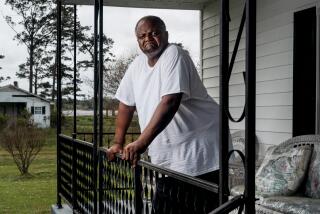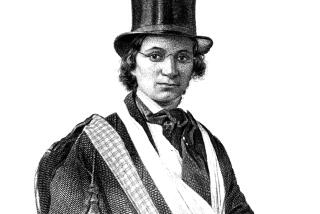The family biz was slavery
- Share via
In “Traces of the Trade: A Story From the Deep North,” airing tonight as the season opener of the PBS documentary series “P.O.V.,” a small band of descendants of the slave-trading DeWolfs of Bristol, R.I., confronts its family history. First-time director/producer/writer Katrina Browne sent invitations to 200 relatives near and far, known and unknown, to join her on a trip to the three points of the Atlantic slave trade as practiced by the DeWolfs, “the largest slave-trading family in U.S. history”: Bristol, where the family lived; Ghana, where they bought their slaves; and Cuba, where they owned plantations. Nine signed on. Making a film about it all seems to have been part of the deal from the beginning.
Clearly the point was to say something novel about slavery, something that would impel viewers toward some sort of outward action or inner change -- “What could we do . . . to help repay the enormous harm our ancestors caused?” Browne asks, as if the options would somehow become more evident after their tour. The film is on its firmest ground focusing on the well-known historical record and it makes the useful-to-remember but hardly obscure points that the traffic in Africans was fundamentally a Yankee business -- one in which both small communities and large economies were implicated -- and that we still live in a world built on the labor of the poorly paid or entirely dispossessed
But “Traces” too often comes down to a bunch of white people sitting around talking about black people, or sitting around talking about white people talking about black people -- that is, talking about themselves, and their feelings. There is something fundamentally askew in their quest, as they partake in what might be called slave-trade tourism and engage in arranged dialogues with Africans and African Americans, who treat them with various degrees of curiosity, sympathy and tolerance. (“Are you not ashamed of being here?” one Ghanaian schoolgirl sweetly asks.) It’s all about . . . them.
Though she doesn’t mention it in her film, Browne is no stranger to social action, having co-founded the outreach program Public Allies, which helps train young people as leaders in the nonprofit world. But her film is at bottom just another family-secret documentary, and the DeWolf family secret is too many generations removed to make the sudden breast-beating fully convincing. (It’s not that much of a secret, in any case -- James DeWolf, who got the family started in slavery, has his own Wikipedia entry.) I don’t mean to denigrate the effort, but it’s odd to make the affliction of such knowledge the subject of a movie -- it is necessarily so much less than the affliction it means to address. That Browne and some of her fellow travelers seem to be aware of the fact doesn’t rescue the film from its knot of self-obsession, it merely adds another turn.
--
--
‘P.O.V.’
Where: KCET
When: 9 tonight
Rating: TV-PG (may be unsuitable for youn
More to Read
Only good movies
Get the Indie Focus newsletter, Mark Olsen's weekly guide to the world of cinema.
You may occasionally receive promotional content from the Los Angeles Times.











